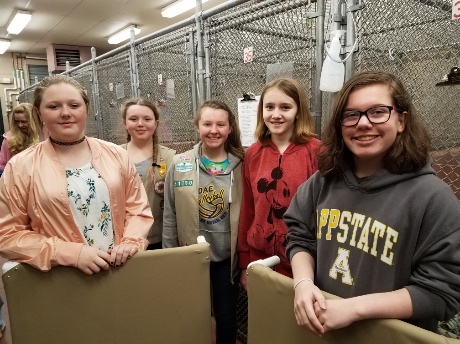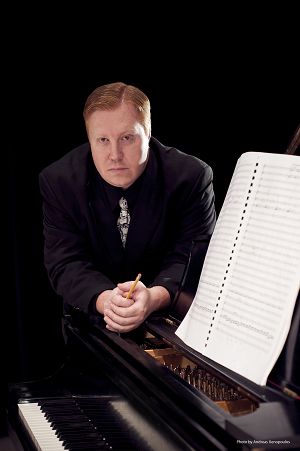Submitted photo and press release:
The world premier of "The Waking," a composition by Composer-in-Residence of the Genesee Chorale Daniel Baldwin, pictured left, is happening next month.
Baldwin will be available for a meet-and-greet with the public beforehand at 6 p.m. on Monday, April 30, at St. James Church on Main Street in Batavia. An open final rehearsal by the Genesee Chorale of “The Waking” will follow at 7 o'clock.
The work, commissioned by Genesee Chorale, will be featured in the Chorale spring concerts entitled "The Call of Humanity" at 7 p.m. May 4 at St. James Church, Batavia, and 4 p.m. May 6 at Pavilion Junior-Senior High School. Presale tickets are $8, available from any Chorale member or online at GeneseeChorale.com. Tickets at the door are $10.
World Turmoil vs. Unity and Peace
As Genesee Chorale Director Ric Jones began the process of putting together this concert program, all he could sense was turmoil in the world.
He said he felt that there was a large divide in the world, a divide that seemed to grow larger every day. He wanted to counteract that divide, and encourage people to embrace unity and peace.
Thus was born “The Call of Humanity,” a mix of contemporary, Gospel, choral and classical music, including the debut of one piece written specifically for the Genesee Chorale -- "The Waking."
“I tried to do a variety of mini-themes within the program,” says Jones. “In the words of Mother Teresa, 'Prayer is about helping the needy.' Other selections, such as 'We Shall Overcome,' 'Harriet Tubman' and 'MLK,' address civil rights and some of the mega figures who have had an impact on that movement."
Anchored in Poetry
The lyrics of "Across the Bridge of Hope" come from a poem written by a group of young friends in Ireland; one of the boys was killed in the fighting shortly after their poem was written.
Two pieces form the foundation of the concert program, "Song of the Universal” by Ola Gjeilo from a Walt Whitman poem, and Baldwin's “The Waking,” from a Theodore Roethke poem.
“Song of the Universal” was the first piece to “grab” Jones as he went through the selection process.
“The text is beautiful,” he said, “and I love the composer. I kept going back to it. I decided I’d make it the centerpiece.”
“The Waking” stems from Jones’ desire to find “something different that inspires the Chorale and brings the community into Chorale.” Luckily, GO ART! grant money was available, so, with the blessing of the Chorale’s Board, Jones began the fun and frustrating process of choosing text and composer for an original piece.
He and his wife, Karen, pored over “a ton of different poems,” but kept coming back to Roethke’s famous poem. (To read Roethke's poem "The Waking," click here.)
“I liked the rhythm in the text,” says Jones, “and I like the overall message.”
The text was also an inspiration for Baldwin.
“The majority of text chosen for me to set is older and in the public domain,” Baldwin said in an e-mail interview. “The poem (Jones) sent was contemporary and very well done, but also spoke to me in a way I was not expecting.
"When writing vocal or choral music, text is the most important element and must flow naturally (speech, even conversational speech, has its own rhythms, etc.).”
It Begins with Text
For Baldwin, the text is the beginning.
“I always write out the poem by hand and apply rhythms to the text based on what feels natural when reading the poem aloud,” he said. “Then, based on the message and perceived mood of the poem, I assign themes to these rhythms, harmonize, etc. It’s a process!”
Baldwin said he hopes that people “read through the wonderful text in advance of hearing the piece. A vocal or choir performance is the musical equivalent to a dramatic reading. I set the poem how I heard it and how the text affected me. I hope the audience enjoys my interpretation.”
Director Jones has published some of Baldwin’s other works as part of his Imagine Music business.
“I love his music,” Jones said, “and I’ve watched him evolve. His music feels cinematic to me usually – that epic sound with grandiose chords. I wanted to see what he’d do with this text.”
What Baldwin did was surprise Jones.
“This was more on the contemporary side,” Jones said. “It is different than I expected, and the first time I heard it, I went ‘hmmm,’ but as I listened, there was something haunting about that motif.”
It is, he notes, a challenging piece and Chorale members have had to work hard to prepare it for concert.


